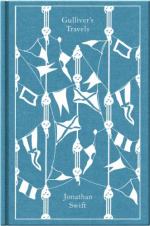|
|
Gulliver's Travels Author/Context
Jonathan Swift (1667-1745)
Jonathan Swift is one of the multitudes of brilliant writers that hail from the Emerald Isles. Born to English parents in Dublin in 1667, Swift became a product of Irish culture and learning. He was educated at the esteemed Kilkenny School and Trinity College in Dublin, and became an assistant to author and diplomat Sir William Temple in Moor Park in Surrey. He left this position after Temple died in 1699 to earn his priest's ordination, and picked up his first parish in Kilroot (near Belfast). During this mobile time of religious exploration and geographic cavorting, Swift began to explore his frustrations with society through his writings. He wrote about the poverty he saw amongst the people, he wrote about his friendships with two notable women (Esther Johnson and Esther Vanhomrigh), he wrote about the typical daily life of city folk, and he wrote about the problems he witnessed in the social order. It is this meticulous writing that makes Swift one of the most renowned satirists of English society and British history. He believed that women deserved to be educated, that social conventions were outdated and must be changed, and that qualities of mind (and not physical beauty) should be the foundations of love. In many ways, Swift was ahead of his time in his pull for a feminist revolution. Perhaps because of his more modern and honest philosophy, Swift fell in love with Esther Vanhomrigh, for whom he invented the name "Vanessa," which appears in much of his poetry. These writings reflect a mutual admiration, in which both man and woman learn from each other. Unfortunately, the two lovers never married, for Esther ("Vanessa") died in 1722, before the publication of Gulliver's Travels.
Swift continued to work as a clergyman in Ireland, traveling throughout the United Kingdom, writing on both secular and parochial subject matter. He also found a heavy interest in politics, taking up weight in the Tory party of England's governmental party system. From such observations in government and religion, and love and gender inequality, Swift produced an enormous body of work. His writings fall into several categories, including poetry, short stories, political essays, and novels. Some highlights include "A Tale of a Tub," "A Modest Proposal," "A Description of Morning," "A Description of a City Shower," "The Progress of Marriage," "A Satirical Elegy on the Death of a late Famous General," "A Lady's Dressing Room," and of course, Gulliver's Travels, published in 1726.
Gulliver's Travels is perhaps Swift's most prolific and well-known work, spanning a literary sixteen years in physical journey and countless more in personal exploration. In it, Swift explores gender differences, politics, class, money, race, science, education, exploration, love, physical strength, physical beauty, and more, and forces stringent satirical commentary on each. The novel falls into typical the typical Swift canon, in which he is recognized as the following: "the 'savage indignation' of the merciless satirist, the self-tormenting 'conjured spirit,' the champion of 'human liberty'" (Rawson xviii).
Because Swift wrote about so much of what he observed, his work has been studied not only for its contribution to the historical library of work, but also for its hallmark as a canon of satirical writing. Furthermore, his existence as an Irish writer and poet, places him amongst the ranks of other Irish revolutionary writers such as W.B. Yeats. According to Swift scholar Claude Rawson, "That Swift remains an Irish hero, in the eyes of the descendants of these natives or the representatives of their interest, is a splendid and honorable fact."
Swift lived a full life into his seventies, an especially long lifespan in his time. In 1742, he was declared of unsound mind, due to senility and excessive dizziness that is now known as the disease Meniere's syndrome, an illness of the inner ear, which causes dizziness. Since nothing was known of the disorder in the 18th century, everyone (including Swift himself) thought he was insane. After descending into a life of privacy and dementia, Swift died on October 19, 1745.
Bibliography
Rawson, Claude. The Basic Writings of Jonathan Swift. Random House, New York: 2000.
Swift, Jonathan. Gulliver's Travels. Penguin Books, London: 1968. (quoted)
Swift, Jonathan. Gulliver's Travels. Edited by Albert J. Rivero. W.W. Norton and Company, New York: 2002.




